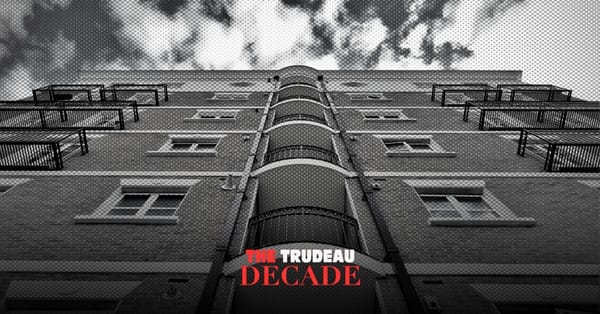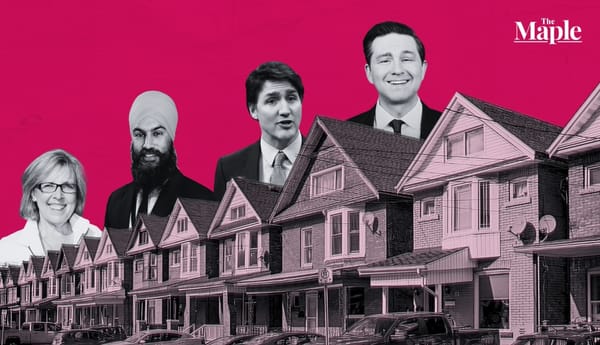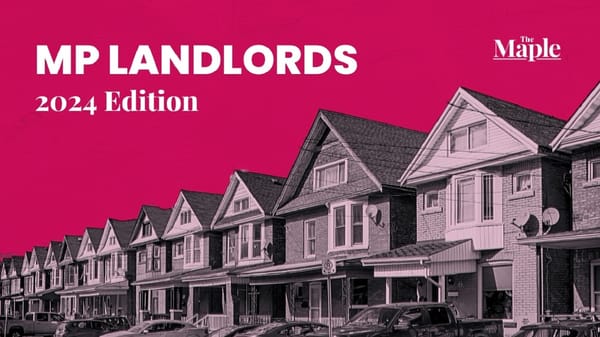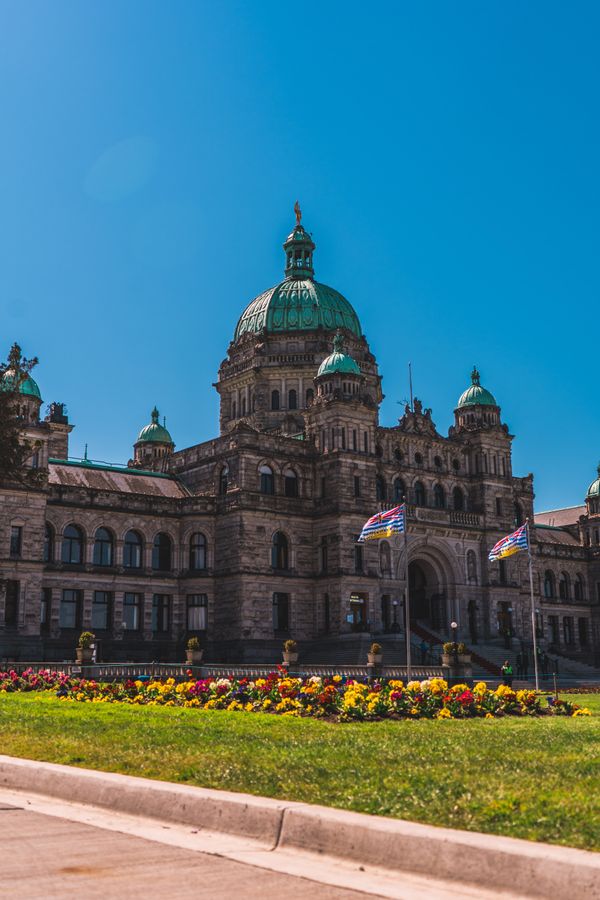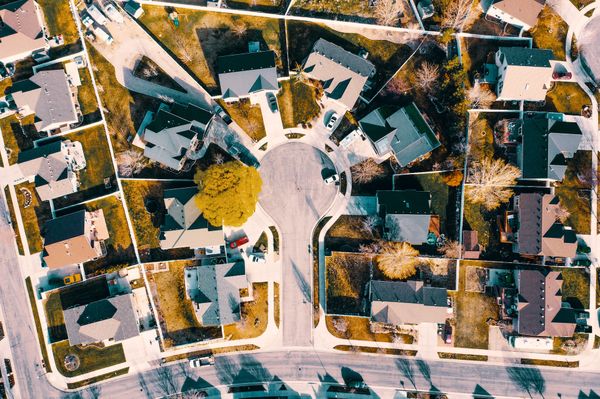Canada is deep in the midst of a housing crisis that shows no sign of breaking any time soon. Want to ever own a house in a major city? Too bad. Not going to happen unless you have generational wealth or property you can sell for a down payment. Looking to move outside the major areas to save a bit of money? Good luck! Prices throughout the country have risen astronomically, so even the more ‘affordable’ spots are now well out of reach for most people. Thinking about renting? Prepare yourself for paying more to live in a smaller space than ever before — that is, if you can find a suitable place at all.
The situation is bleak. The roots of the housing crisis are deep, and, as outlined in a course we published last year, it will take major systemic, government-led action to make any serious progress in combatting it. There are no steps as individuals that we can take to solve the problem. And yet, there are things we can do to help. One of these things, which will serve as an act of resistance against greedy property owners and landlords throughout the world, is to stop using Airbnb. Here’s why.
Taking Houses Off The Market
One contributor to the housing crisis is a lack of supply, particularly with affordable options. Airbnb has made this issue worse. In recent years, many existing landlords determined that they could make more money putting their properties up as Airbnbs as opposed to renting them out to long-term tenants. As such, many did just that. At the same time, other prospective property buyers decided to purchase homes or condos solely for the purpose of renting them out as Airbnbs.
A 2019 study from three academics at McGill University’s School of Urban Planning about the impact of short-term rentals on the housing market in Canada found that in 2018, “31,000 entire homes were rented frequently enough [on Airbnb] that they are unlikely to house a permanent resident.” That is a significant number of homes, and Airbnb has only grown since the study was released, going from a revenue of $3.6 billion USD in 2018 to $5.9 billion USD in 2021.
The pandemic has offered further proof of Airbnb impacting housing supply, as when short-term rentals became less profitable, options for long-term tenants shot back up. For example, a July 2020 Zoocasa report found that “there were 83 per cent more Toronto condo apartments listed for rent in June of this year, compared with June 2019. But rental listings were 257 per cent higher over that same period for 10 buildings in the downtown entertainment district and waterfront, a popular area for Airbnb visitors.”
Of course, the declining profitability of Airbnbs wasn’t the only thing responsible for this shift, but it did play a notable role, including in helping to turn “ghost hotels,” which are buildings with very few actual tenants relative to short-term rentals, into places people live. At least momentarily, that is, as once this trend changed, owners started turning their properties back into short-term rentals (and potentially illegally evicting tenants to do so).
As it currently stands, according to the Inside Airbnb database, Toronto has nearly 15,000 listings, more than 68 per cent of which are for entire homes/apartments. Meanwhile, Montreal has more than 12,300 listings (75 per cent of which are entire homes/apartments) and Vancouver has more than 4,900 listings (82 per cent of which are entire homes/apartments).
Driving Up Prices
The main thing people are complaining about in this housing crisis is the cost of a home. Airbnb has contributed to this problem as well.
The McGill study’s authors, David Wachsmuth, Danielle Kerrigan and Jennifer Combs, write that, “The key finding from this work is that the growth of [short-term rentals] has come at the expense of both housing availability and affordability in cities around the world, both by facilitating the conversion of apartments and homes into dedicated short-term rentals and by increasing the economic value of properties which host STRs either full-time or part-time.”
Airbnb taking rentals off the market means fewer options for renters to choose from, thereby driving up rates. The same is true for housing supply, with the wealthy buying up multiple properties to use as short-term rentals, thereby helping to raise the value of existing homes to a point where the vast majority of people are priced out. In an interview with the CBC, Wachsmuth said that short-term rentals even taking up just 1 per cent or less of Toronto’s housing supply would be “by far enough” to raise both rent and housing prices in the city.
The same seems to be true of other cities throughout the country, and outside it as well. For example, researchers wrote in a 2019 Harvard Business Review article, based on a 2017 study they did, that, “In aggregate, the growth in home-sharing through Airbnb contributes to about one-fifth of the average annual increase in U.S. rents and about one-seventh of the average annual increase in U.S. housing prices.”
Destroying Communities
But beyond merely preventing new people from buying or renting homes in an area, Airbnbs also play a role in destroying the communities already there.
On a systemic level, the McGill study notes that, “Some scholars have further drawn a connection between STRs and gentrification, arguing that the financial incentives which STRs offer to landlords drives the displacement of low-income residents in favour of tourists.” On a personal level, those who reside in buildings that either allow Airbnbs or don’t actively crack down on them report their living conditions becoming significantly worse once units start being used for short-term rentals.
Lifehacker has published an article titled “What Can You Do If Airbnb Is Ruining Your Neighborhood?,” writing, “Having a short-term rental in your neighborhood can result in a long list of misery: Noisy parties, clogged parking, and property damage. If you haven’t heard a lot of nightmare stories, that might be because Airbnb spends a lot of money to keep those out of sight.
“The problem is the guests aren’t part of your neighborhood, and so they may not feel bound by the normal rules of polite co-existence. But short-term rentals also lack the sort of staff and management traditional hotels offer. The owners are often off-site or even largely anonymous. While most short-term rentals go smoothly, there are plenty of examples of Airbnbs that ruin neighborhoods. The problem got so bad that Airbnb and Vrbo had to team up to create an initiative to shut down so-called ‘party houses’ on their platforms in order to avert a PR disaster.”
One commenter on a popular Reddit thread discussing Airbnb wrote, “I boycott Airbnb because it ruined my life. In the space of a couple years every flat around me became a full time Airbnb property in a major city. I loved my place so much and had it for 10 years. My life became unbearable. Parties, stag dos, music videos, birthdays, people locked out, my Mail going missing, doors left open, guests stomping around and coming home at 3am 7 days a week. Airbnb doesn’t do jack to help the neighbours. I got asked to be on a tv show about this issue. All the long term tenants in that block ended up leaving. It was sad. Decimated that community. Also ironically Airbnb set up an office within eyeshot of the front door to the building. Pretty infuriating.”
It can get worse, though. In May 2018, a man was shot and killed during a party at an Airbnb in the Greater Toronto Area. In January 2020, three people were shot to death and two injured at an Airbnb in downtown Toronto. Later that year, in October, another shooting happened in an Airbnb at a building just a couple kilometres away. In this case, multiple bullets went through the wall into the neighbouring unit, where someone actually lived. Fairbnb Canada compiled some of these and other incidents in a Twitter thread that month, writing, “Since 2016, there were 10 #Airbnb related shootings, 1 kidnapping – Russian roulette with a loaded gun & 2 stabbings in #Topoli, maybe more. 5 shootings in Airbnbs since 3 young men died in 2020. This list doesn’t include the GTA.” All of this took place within a few years in a specific area of one province in one country.
Of course, these sorts of events aren’t exclusive to Airbnbs, and, according to the company, are rare. Still, the evidence is overwhelming that Airbnbs have a negative impact on the communities they infiltrate.
It’s worth mentioning here, too, that Airbnb has also allowed its platform to be used by hosts with listings in illegal settlements on occupied Palestinian land, thereby allowing people to profit off of violating international law (although the company claims it doesn’t collect a profit itself on these listings). In November 2018, the company announced it would ban such listings, but then went on to reverse course and explicitly denounce the BDS movement.
Paying Off The Rich
Some people have the impression that using Airbnb is a noble way to help out people in the communities they’re visiting. This is not the case, unless you count helping the rich get richer.
The McGill study found that “the top 10 per cent of [Airbnb hosts] earn a majority of all revenue. Contrary to the rhetoric of ‘home sharing’, almost 50 per cent of all Airbnb revenue [in Canada in 2018] was generated by commercial operators who manage multiple listings.” This was even worse in some cities, such as Montreal, for example, where the top 1 per cent of hosts made 30 per cent of the city’s total revenue.
The study notes that Airbnb is becoming increasingly commercialized as well. They write that, “Across Canada, there are fifteen hosts that managed over 100 active listings each in the past year, four of whom managed over 250 active listings each. The vast majority of these hosts also earned over $1 million in the last year. In total, 57 hosts earned more than $1 million in 2018.” A 2019 CBC investigation dug deeper on this trend in Canada, finding that “while Airbnb promotes itself as a darling of the sharing economy, touting stays in real people’s homes and relationships with personable hosts, its biggest players in Canada are actually — and sometimes secretly — multimillion-dollar for-profit corporations.”
The CBC describes one profile on the site as follows: “Sporting a crisp button-up shirt in his profile photo, smiling Airbnb host ‘Alejandro’ states he’s been around the world and thus understands other travellers ‘much better.’” It goes on to note, “According to the Airbnb data gathered by CBC News over a 24-hour period earlier this month, he had 238 listings in Montreal, the Ottawa area, Toronto, Calgary, Edmonton and Vancouver — more than any other host. Surely a Herculean task for one man to manage, even one who declares ‘hospitality my life!’”
Seems strange, right? Well, the CBC found that, “It turns out Alejandro had help. An internet image-matching search using his profile photo shows he was actually a paid employee, described as an ‘Airbnb specialist,’ for Montreal-based Corporate Stays, a multimillion-dollar company that mostly rents longer-term executive suites to businesses relocating staff.” There are many other similar cases detailed in the article.
In Toronto, according to Inside Airbnb, 48 per cent of hosts have more than one listing, with about 12 per cent of these hosts having 10 or more. The top three hosts in terms of number of homes/apartments have 151, 73 and 61 listings, respectively.
In Montreal, 47 per cent of hosts have more than one listing, with about 18 per cent of these hosts having 10 or more. The top three hosts in terms of number of homes/apartments have 155, 76 and 75 listings, respectively.
In Vancouver, 43 per cent of hosts have more than one listing, with about 10 per cent of these hosts having 10 or more. The top three hosts in terms of number of homes/apartments have 71, 49 and 34 listings, respectively.
So, despite what Airbnb may have looked like at the beginning of its existence, an accurate description of who profits from the service now is already-rich property owners that are using it as a business — not individual families seeking to rent a room in their place out once in a while to bring in some extra cash.
Costs and Fees
A common reason cited for Airbnb use is that it’s cheaper than hotels, motels, traditional bed and breakfasts, and other options. Perhaps that was true in the past, particularly when it was mostly being used to rent out single rooms in places where people actually lived. However, it appears that may no longer be accurate in many cases.
An October 2021 study from Upgraded Points found that when travellers choose to rent an entire unit instead of just one room (which made up 81 per cent of all bookings in 2017), Airbnbs were more expensive than hotels in 46 of 50 cities in the United States they looked at, with the most significant difference being about $328 USD in Los Angeles. In Canada, the McGill study found the majority of listings in all areas are entire homes, going up to 95 per cent in rural areas, which indicates that this data from the U.S. study is relevant here as well.
Plus, this shift in prices isn’t a coincidence, nor is it likely to end any time soon. Instead, it’s baked into the very nature of the company, much like Uber. While Airbnb is different than Uber in that hosts set the prices, the company is responsible for charging some fees alongside the booking, and those have been going up.
In a February 2020 Passage article regarding Uber, James Wilt wrote, “The supposedly affordable rides offered by Uber and Lyft will be majorly subsidized by investment firms based in the United States. While fares are expected to rise in the wake of the company’s initial public offerings in mid-2019, they remain artificially suppressed as part of a monopolizing strategy modeled by Amazon, which famously didn’t turn a profit for 14 years after going public. Why do that? To destroy the competition. ” Keep this in mind as you watch Airbnb prices rise.
Even if booking an Airbnb does end up being cheaper on the surface, consider if the savings are worth contributing to the damage done by the platform in the cities you care enough about to visit, and how such practices may impact where you actually live. And then, of course, decide if you want to pay hotel-like prices with none of the perks, and instead get the privilege of what one Twitter user described as “messaging back and forth with a guy who keeps vaguely threatening you and assigning you chores.”
In short, you should stop using Airbnb and convince your friends to do so as well because it’s playing a devastating role in the housing crisis by reducing supply, robbing renters of places to live, increasing prices and ruining communities. It serves to make a narrow chunk of people rich, and it’s increasingly more expensive than other options.
This responsibility shouldn’t lay solely or even primarily with individuals, as governments need to take action to crack down on short-term rentals. I do plan to write about what such measures should look like, as well as what they do look like and how they’re performing, in the future. But as a preview, I can say that the measures some cities in Canada have adopted are nowhere near strong enough, and largely go ignored and then unenforced.
Stronger laws can and should be passed, but you are able to stop using Airbnb, and other short-term rental platforms, today. Landlords and property owners are, above all, seeking to make as much money as possible. Removing the economic incentive for them to become Airbnblords is essential to taking our cities back, and protecting the ones you love enough to visit.



